
Azawad, or Azawagh, was a short-lived unrecognised state lasting between 2012 and 2013. Azawagh (Azawaɣ) is the generic Tuareg Berber name for all Tuareg Berber areas, especially the northern half of Mali and northern and western Niger. The Azawadi declaration of independence was declared unilaterally by the National Movement for the Liberation of Azawad (MNLA) in 2012, after a Tuareg rebellion drove the Malian Armed Forces from the region.

From 1990 to 1995, a rebellion by various Tuareg groups took place in Niger and Mali, with the aim of achieving autonomy or forming their own nation-state. The insurgency occurred in a period following the regional famine of the 1980s and subsequent refugee crisis, and a time of generalised political repression and crisis in both nations. The conflict is one in a series of Tuareg-based insurgencies in the colonial and post-colonial history of these nations. In Niger, it is also referred to as the Second or Third Tuareg Rebellion, a reference to the pre-independence rebellions of Ag Mohammed Wau Teguidda Kaocen of the Aïr Mountains in 1914 and the rising of Firhoun of Ikazkazan in 1911, who reappeared in Mali in 1916. In fact the nomadic Tuareg confederations have come into sporadic conflict with the sedentary communities of the region ever since they migrated from the Maghreb into the Sahel region between the 7th and 14th centuries CE. Some Tuareg wanted an independent Tuareg nation to be formed when French colonialism ended. This, combined with dissatisfaction over the new governments, led some Tuareg in Northern Mali to rebel in 1963.
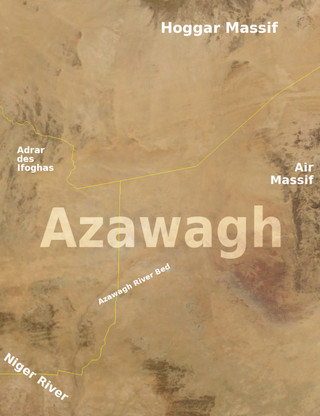
The Azawagh is a dry basin covering what is today the northwestern Niger, as well as parts of northeastern Mali and southern Algeria. The Azawagh is mainly made up of Sahelian and Saharan flatlands and has a population that is predominantly Tuareg, with some Arabic-speaking and Wodaabe minorities and a recent influx of Hausa and Zarma.

The 2007-2009 Tuareg rebellion was an insurgency that began in February 2007 amongst elements of the Tuareg people living in the Sahara desert regions of northern Mali and Niger. It is one of a series of insurgencies by formerly nomadic Tuareg populations, which had last appeared in the mid-1990s, and date back at least to 1916. Populations dispersed to Algeria and Libya, as well as to the south of Niger and Mali in the 1990s returned only in the late 1990s. Former fighters were to be integrated into national militaries, but the process has been slow and caused increased resentment. Malian Tuaregs had conducted some raids in 2005–2006, which ended in a renewed peace agreement. Fighting in both nations was carried on largely in parallel, but not in concert. While fighting was mostly confined to guerrilla attacks and army counterattacks, large portions of the desert north of each nation were no-go zones for the military and civilians fled to regional capitals like Kidal, Mali and Agadez, Niger. Fighting was largely contained within Mali's Kidal Region and Niger's Agadez Region. Algeria helped negotiate an August 2008 Malian peace deal, which was broken by a rebel faction in December, crushed by the Malian military and wholescale defections of rebels to the government. Niger saw heavy fighting and disruption of uranium production in the mountainous north, before a Libyan backed peace deal, aided by a factional split among the rebels, brought a negotiated ceasefire and amnesty in May 2009.
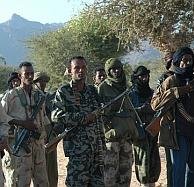
The Nigerien's Movement for Justice is a largely ethnic Tuareg militant group based in northern Niger. However the group also includes other nomadic ethnicities within this area, such as the Toubou and the Fulani. These groups have been battling the Niger government since 2007.
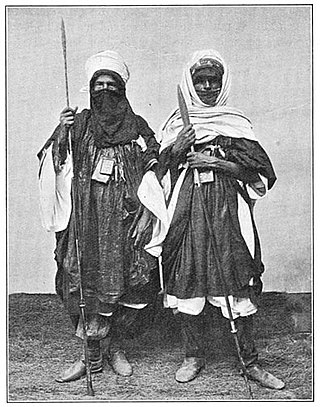
The Kaocen revolt was a Tuareg rebellion against French colonial rule of the area around the Aïr Mountains of northern Niger during 1916–17.
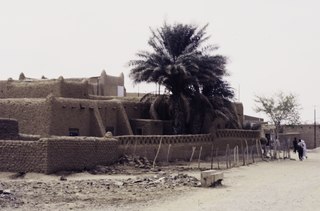
Kaocen Ag Geda (1880–1919) was a Tuareg noble and clan leader. Born in 1880 near wadi Tamazlaght Aïr, Kaocen from tribe of Ikazkazan berber, a subset of the Kel Owey confederation. He led the Kaocen revolt, a rebellion against French colonial rule of the area around the Aïr Mountains of northern Niger, during 1916–17. After the defeat of the revolt, Kaocen fled north; he was captured and hanged in 1919 by local forces in Mourzouk, Libya.

The Union for Democracy and Social Progress is a centrist political party in Niger. With its support base in the Tuareg people of northern Niger, the party's history is tied to that of the Tuareg rights movements which surrounded the Tuareg insurgencies of 1990–95 and 2007–09. Its slogan, "Amana", is a Hausa language word for "Trust"
Rhissa Ag Boula is a Nigerien Tuareg politician and former leader of rebel factions in both the 1990–1995 and the 2007–2009 Tuareg based Insurgencies. He was Nigerien Minister of Tourism from 1996–1999, and again from 1999–2004. His arrest on murder charges in 2004 precipitated armed conflict between his supporters and the Niger government. A political leader following the 1995 peace, he again joined a rebel faction from abroad in 2007, creating his own faction from abroad in 2008, and joining the peace process in 2009. In 2010 he was again arrested after returning to Niger.
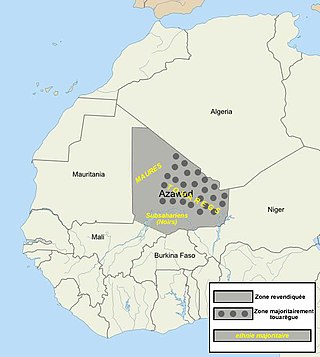
The 2012 Tuareg rebellion was the early phase of the Mali War; from January to April 2012, a war was waged against the Malian government by rebels with the goal of attaining independence for the northern region of Mali, known as Azawad. It was led by the National Movement for the Liberation of Azawad (MNLA) and was part of a series of insurgencies by traditionally nomadic Tuaregs which date back at least to 1916. The MNLA was formed by former insurgents and a significant number of heavily armed Tuaregs who fought in the Libyan Civil War.

The National Movement for the Liberation of Azawad or the Azawad National Liberation Movement, formerly the National Movement of Azawad, is a militant organization based in northern Mali.
Iyad Ag Ghaly, also known as Abū al-Faḍl, is a Tuareg Islamist militant from Mali's Kidal Region. He has been active in Tuareg rebellions against the Malian government since the 1980s – particularly in the early 1990s. In 1988, he founded the Popular Movement for the Liberation of Azawad. In the latest episode of the Tuareg upheavals in 2012, he featured as the founder and leader of the Islamist militant group Ansar Dine.
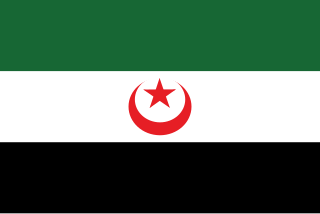
The Arab Movement of Azawad is an Arab military organization active in Azawad/northern Mali. Initially known as the National Liberation Front of Azawad, it was formed in early 2012, during the 2012 Tuareg rebellion. The MAA claims to be a secular, non-terrorist organization, whose main objective is to defend the interests of all the Arab peoples of northern Mali.
The Council of Resistance for the Republic is a group led by former rebel Leader Rhissa Ag Boula which aims to topple the National Council for the Safeguard of the Homeland and restore Mohamed Bazoum as President of Niger following his ousting by the military in the 2023 Nigerien coup d'état in July 2023.
The Temoust Liberation Front (FLT), or Tamoust Liberation Front was a Tuareg militant group that operated in Niger between 1993 and 1997.
Hassan Ag Fagaga, born around 1959 or 1966, in Kidal, Mali, was a Malian soldier and a Tuareg rebel.
El Hadj Ag Gamou, born December 31, 1964, in Tidermène, Mali, is an Imghad Tuareg Malian division general. Gamou is currently the governor of Kidal Region since November 22, 2023, and has also been the head of his faction of Imghad Tuareg Self-Defense Group and Allies since the group's foundation. Prior to his governorship, Gamou served in the Malian army, commanding Malian troops against Ansar Dine and the National Movement for the Liberation of Azawad (MNLA) in the early stages of the Mali War.
Mohamed Akotey is a Nigerien politician of Ifoghas Tuareg heritage and former rebel leader.

The High Council for the Unity of Azawad (HCUA) (French: Haut conseil pour l'unité de l'Azawad) is a Tuareg political movement formed on May 2, 2013, during the Mali War. The movement was initially called the High Council of Azawad (HCA) (French: Haut conseil de l'Azawad) before changing its name on May 19, 2013.
Between June 28 and 29, 1990, Tuareg rebels from the People's Movement for the Liberation of Azawad (MPLA) attacked the Malian Army outpost at Ménaka, sparking the Tuareg rebellion of 1990 to 1996.









